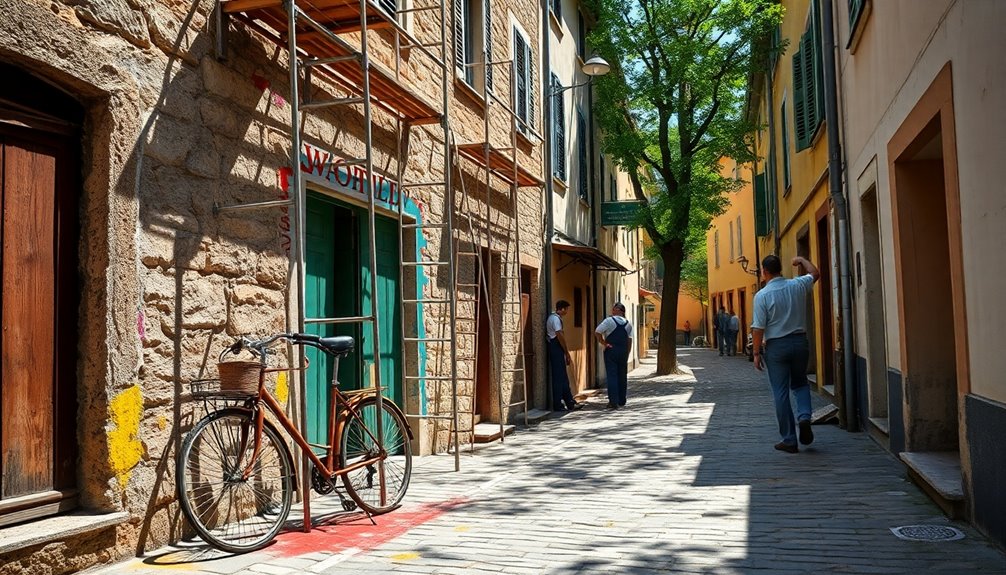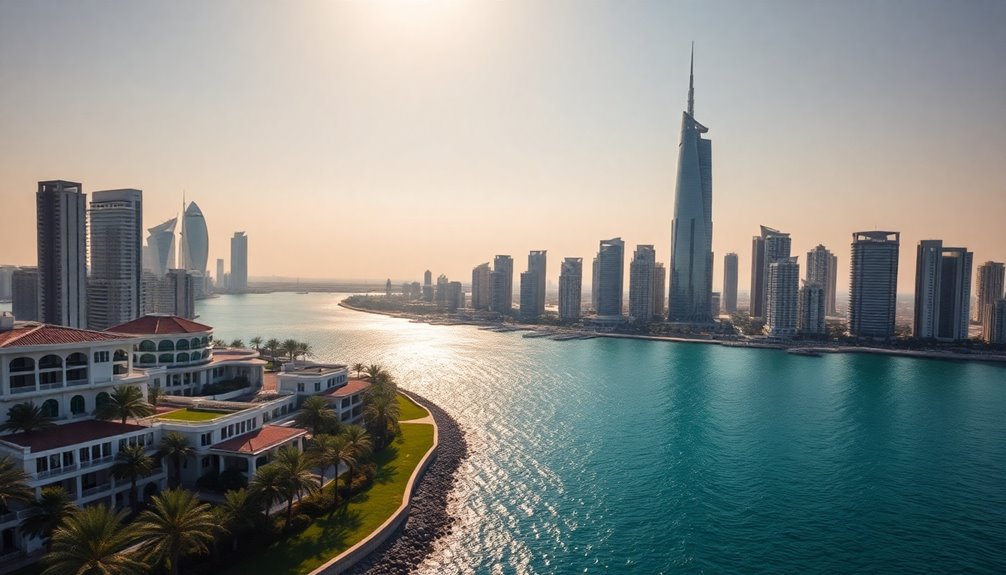When you're tackling maintenance and renovation in a foreign country, start by understanding local laws and regulations. You'll need to secure necessary permits and guarantee compliance to avoid costly penalties. Creating a detailed budget is vital; factor in renovation costs, potential fees, and a contingency fund for surprises. Engaging local professionals helps you navigate cultural and language differences while assuring quality work. Additionally, assess local amenities and market trends to enhance your investment's value. By grasping these essentials, you can make informed decisions that contribute to a successful renovation experience abroad. There's much more to explore.
Key Takeaways
- Understand local regulations and obtain necessary permits to avoid legal complications during renovations.
- Assess local amenities and climate to inform maintenance planning and enhance property value.
- Engage local professionals for insights on construction practices and materials, ensuring compliance with regional standards.
- Develop a comprehensive budget, including a contingency fund for unforeseen renovation expenses.
- Maintain clear communication with contractors and regularly review project timelines to ensure successful completion.
Appeal of Overseas Renovation

Renovating overseas isn't just about fixing up a property; it's an immersive experience that lets you dive deep into local culture while preserving the charm of historical architecture.
When you tackle a renovation project in a foreign country, you get to connect with the community and learn about its heritage. This hands-on approach not only enhances your personal experience but can also lead to lucrative investments, like holiday homes or rental properties in tourist-friendly areas.
Navigating local regulations is essential. Each country has its own set of rules governing renovations, and understanding these can save you time and money.
You'll want to assess the property's condition and gauge market demand, setting realistic expectations that align with your goals. Incorporating sustainable materials and locally sourced resources not only boosts the eco-friendliness of your project but also fosters a deeper connection with the environment.
Choosing the Right Location

When you're choosing the right location for your property, think about the local amenities that will enhance your daily life.
Look for areas with potential for future development, as this can greatly boost your investment.
A vibrant community with cultural and social opportunities not only enriches your experience but also makes the property more appealing to future buyers.
Assess Local Amenities
Choosing the right location for your property involves a thorough assessment of local amenities that can greatly affect your living experience. For foreign buyers, understanding what's available nearby can make all the difference in your daily life and the value of your investment.
Here are some key aspects to contemplate:
- Grocery stores and medical facilities: Easy access to essentials guarantees convenience and peace of mind.
- Public transportation options: Proximity to transit considerably eases daily commutes and connects you to urban centers.
- Recreational facilities and parks: These contribute to a vibrant lifestyle and can enhance property value over time.
Additionally, think about the local climate, as it informs your maintenance planning. Areas with harsher climates may require more robust infrastructure and amenities to support residents.
Evaluating these local amenities not only enhances your living experience but also plays a vital role in your renovation projects. The right amenities can make your property more desirable, ultimately benefiting you as a foreign buyer.
Take your time to assess these factors to guarantee that you make a well-informed decision.
Future Development Potential
The future development potential of an area can greatly influence your property investment decisions. When you're choosing a location for renovation, look for areas with planned infrastructure improvements. These developments often lead to increased property values and desirability.
Research local government development plans to uncover potential projects like new schools or transportation links, which can enhance your property's resale value and overall living experience.
It's also essential to investigate zoning laws in your selected area. These building regulations dictate what types of developments are allowed and can markedly impact your long-term investment returns.
Furthermore, access to amenities like parks, shops, and public transport can greatly affect living conditions, making your property more attractive to future buyers or renters.
Additionally, analyzing local demographic trends, such as population growth or shifts in employment, offers insights into the area's market stability and future development potential.
Community Vibrancy Factors
Community vibrancy plays a significant role in shaping your property investment decisions. When you choose a location, consider how vibrant the community is, as it directly influences your living space experience and the potential for a successful renovation.
A lively neighborhood not only enhances your daily life but also boosts property resale value.
To help you evaluate community vibrancy, think about these key factors:
- Access to Amenities: Look for grocery stores, schools, and healthcare facilities that make your life easier.
- Transportation Options: Proximity to public transit and major roads can simplify commuting and enhance appeal.
- Community Engagement: Events like local markets and festivals create a sense of belonging and attract residents.
Additionally, don't overlook the importance of architectural heritage and local culture.
These elements can enrich your living experience and align with your lifestyle preferences. By carefully considering these factors, you can guarantee that your investment not only meets your needs but also thrives in a dynamic environment. Moreover, having a strong understanding of effective co-parenting communication can help you navigate any family dynamics that may arise while settling into a new community.
Navigating Legal Requirements

When renovating abroad, you need to grasp local regulations that govern property ownership and renovations. One must also be aware of any specific building codes and permit requirements in the particular country or region where they are managing property abroad. This is especially important to avoid any legal trouble or delays in the renovation process. It is beneficial to consult with local experts or lawyers who are familiar with the regulations and procedures to ensure that all necessary permissions and documentation are obtained before beginning renovation work.
Different countries have specific permits and documentation requirements, so getting familiar with these is essential before starting any work.
Ignoring these legalities can lead to costly penalties and complications down the line.
Understanding Local Regulations
Maneuvering local regulations is vital for anyone pondering renovations abroad, as ignoring these laws can lead to serious legal complications.
Before diving into your renovation process, make certain to familiarize yourself with the specific requirements in your chosen country. Each locale has its own set of rules, particularly regarding foreign property ownership.
Here are a few key points to reflect on:
- Many countries require specific permits for structural changes, especially in historical districts.
- Engaging with local authorities can help clarify zoning laws and avoid penalties.
- Consulting local real estate attorneys guarantees you understand any restrictions and tax implications.
For example, in Italy, the renovation process can be particularly complex, with permits like CILA (Communication of Start of Works) and SCIA (Segnalazione Certificata di Inizio Attività) being vital for various activities.
Failing to comply with local regulations can result in fines or even the need to reverse unauthorized work.
It's essential to engage local professionals who can guide you through the necessary steps to make certain your renovations not only enhance your property but also adhere to all legal requirements.
Required Permits and Documentation
Steering through the maze of required permits and documentation is essential for a successful renovation abroad, especially in Italy. Understanding specific permits like CILA (Communication of Start of Works) and SCIA (Segnalazione Certificata di Inizio Attività) is vital. You'll also need written permission from all property owners to kick off the restoration process.
Here's a quick overview of essential permits and documentation:
| Permit/Documentation | Description | Required For |
|---|---|---|
| CILA | Communication of Start of Works | Minor renovations |
| SCIA | Certified Notification of Start Activity | Major renovations |
| Cadastral Plan | Layout of property boundaries | Technical submission |
| Visure | Title and zoning verification | Ensuring legal compliance |
Additionally, appoint a professional to navigate municipal archives for necessary documentation. Conduct thorough due diligence to verify titles and zoning codes to avoid complications. Familiarizing yourself with local laws concerning foreign property ownership and consulting local real estate attorneys can guide you through compliance and potential renovation restrictions.
Financial Planning Essentials

Maneuvering the financial landscape of renovations abroad can feel overwhelming, but having a solid plan in place makes all the difference. Effective financial planning is essential when you decide to renovate a home in a foreign country.
Start by developing an extensive budget that covers all expenses, including:
- Purchase price and renovation costs
- Fees, taxes, and utility connection charges
- A contingency fund of 10-20% for unexpected expenses
Securing financing can be tricky for foreign buyers, so explore various options and gather necessary documentation to access funds.
Don't forget to factor in currency exchange fluctuations that can impact your overall budget. Keeping an eye on exchange rates helps you prepare for potential changes in costs.
Early consultations with local utility companies can also save you from surprise fees and complications.
Regularly monitor your spending and maintain clear communication with contractors to stay on track and avoid financial hurdles.
Engaging Local Professionals

Maneuvering the complexities of a renovation abroad requires a strategic approach to engaging local professionals. These experts are essential for ensuring compliance with local regulations and building codes, which can vary considerably between different countries.
By utilizing multilingual professionals, you can enhance communication, effectively reducing language barriers and fostering smoother collaboration throughout the project.
Local experts bring invaluable insights into construction practices, material sourcing, and cultural nuances that can greatly influence your renovation's success. To find reputable contractors, consider using platforms like Trustoo.nl in the Netherlands, where community feedback helps you identify trustworthy service providers.
Once you've selected your professionals, it's important to establish clear contracts and obtain detailed quotes. This step sets expectations upfront and helps prevent budget overruns, which can derail your project.
Make sure to discuss timelines and deliverables to keep everyone on the same page. Engaging local professionals isn't just about hiring help; it's about leveraging their knowledge and understanding of the local landscape to navigate challenges effectively. Additionally, understanding the local construction practices can significantly impact the outcome of your project.
Understanding Maintenance Procedures

Understanding maintenance procedures is vital for any property owner abroad, as it can greatly impact the longevity and value of your investment.
Knowing the difference between ordinary and extraordinary maintenance is essential. Ordinary maintenance involves routine repairs that usually don't require permits, while extraordinary maintenance includes significant renovations needing building permits.
Here are three key points to remember:
- Local Regulations: Always research local regulations before starting any work, especially in protected buildings where even minor repairs might require clearance.
- Engage Local Professionals: Collaborating with local experts can help you navigate complex bureaucratic requirements, guaranteeing you comply with maintenance laws and streamline procedures.
- Communication is Key: Regularly discuss maintenance tasks and costs with your contractors. This helps maintain budget control and guarantees all necessary permits for extraordinary work are secured.
Additionally, understanding the importance of sustainable materials can enhance both the aesthetic and environmental value of your renovations.
Frequently Asked Questions
What Is the Difference Between Renovation and Maintenance?
Renovation and maintenance serve different purposes.
When you renovate, you're making significant changes to improve a property's functionality or aesthetics, often requiring permits.
On the other hand, maintenance involves routine tasks like painting or fixing leaks to keep the property in good shape without altering its structure.
While renovations can boost property value, maintenance focuses on preventing deterioration and ensuring safety.
Understanding this difference helps you manage your property more effectively.
Can You Renovate Your Own House in Italy?
Yes, you can renovate your own house in Italy, but you'll need to navigate local regulations and obtain the necessary permits.
Understanding what qualifies as ordinary versus extraordinary maintenance is essential. If your renovations involve significant changes, you'll likely need to secure permits like CILA or SCIA.
It's wise to engage local professionals to guarantee compliance with Italy's laws and avoid potential fines or complications down the line.
Always do your due diligence!
Can a US Citizen Own Property in Another Country?
Ever wondered if you can snag a piece of paradise abroad? As a U.S. citizen, you can often own property in various countries, but the rules differ wildly.
Some places, like Mexico, require a bank trust for coastal properties, while Italy welcomes you with open arms.
However, watch out for countries like Thailand, where restrictions can catch you off guard.
Always check local laws and tax implications before diving in!
How Much to Fully Renovate a House in Italy?
If you're looking to fully renovate a house in Italy, you should expect to spend between €700 and €1,200 per square meter.
The final cost will depend on your property's condition, the materials you choose, and compliance with local regulations.
Don't forget to budget for professional fees, which can add 10-15% to your budget, and set aside an extra 10-20% for unexpected expenses that might crop up during the process.
Conclusion
Starting on a maintenance or renovation journey abroad can be an exciting adventure, filled with unique opportunities. By choosing the right location and collaborating with local experts, you can transform your vision into reality while ensuring compliance with local regulations. Remember, it's not just about fixing up a space; it's about creating a slice of paradise that reflects your style. So, roll up your sleeves and plunge into this delightful escapade—you might just discover a new home away from home!









